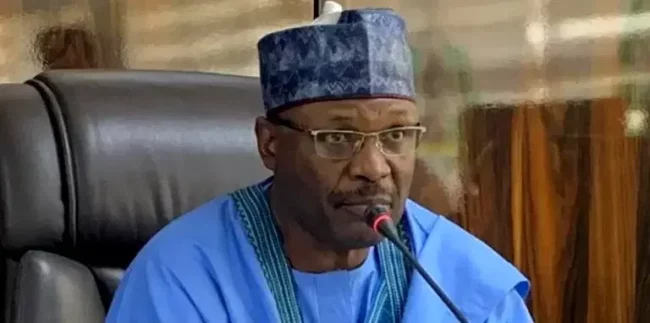The Chairman of the Independent National Electoral Commission (INEC), Prof. Mahmood Yakubu, has called for a significant increase in the Commission’s 2025 budget allocation, citing the inadequacy of the current funding to meet operational demands.
Speaking during a budget defense session with the Joint Committee on Electoral Matters at the National Assembly on Friday, January 10, 2025, Prof. Yakubu detailed the challenges faced in the 2024 fiscal year and outlined the financial requirements for the upcoming year.
Prof. Yakubu revealed that the Commission was allocated N40 billion in 2024, an amount he described as barely sufficient to cover personnel costs and statutory contributions.
“While we received all the funds allocated for 2024, the N40 billion was only enough to pay consolidated salaries, allowances, and statutory social contributions. Unfortunately, many operational activities had to be shelved,” he explained.
Key activities such as Continuous Voter Registration (CVR) and voter redistribution to polling units were left unfunded. The Commission also sought supplementary funding of N10.5 billion to conduct the Edo and Ondo governorship elections, but this allocation fell short, leaving 11 bye-elections pending.
He said: “With a workforce of over 14,700 personnel, including 51 political officeholders, and the introduction of a new minimum wage, the N40 billion allocation cannot even cover personnel costs adequately.”
To address these challenges and effectively plan for upcoming electoral activities, he said INEC has proposed a budget of N126 billion for 2025. Prof. Yakubu listed key areas requiring immediate funding as off cycle elections, CVR and replacement of damaged materials.
ALSO READ: National grid suffers first collapse in 2025
With regard fo the off-cycle elections, the INEC Chairman noted that preparations for the Anambra, Ekiti and Osun governorship elections, and Area Council elections in the Federal Capital Territory would require significant financial input.
He said the resumption of the CVR would take place at over 8,800 centers nationwide to ensure that Nigerians who have come of age can register to vote.
On damaged materials, Prof. Yakubu said the Commission must replace over 440 Bimodal Voter Accreditation System (BVAS) machines, ballot boxes, and voting cubicles lost to attacks and fires during past electoral exercises. He revealed that insurance claims amounting to N205 million have been remitted to the federal treasury, leaving INEC to source replacement funds.
He observed that many of the over 860 facilities nationwide belonging to INEC, including 774 local government offices and 37 state offices also require urgent rehabilitation, just as he underscored the need forearly planning for the next general election, entailing activities such as voter redistribution and procurement of essential materials.
To address the rising cost of elections, Prof. Yakubu proposed sustainable funding mechanisms, including allocating a percentage of the Federation Account to electoral activities.
He also suggested legislative reforms to streamline bye-elections, citing practices in other countries where vacancies are filled by gubernatorial appointments rather than costly elections.
“We must find a more cost-effective way of dealing with elections,” he argued, highlighting the financial strain of bye-elections on the Commission.
Prof. Yakubu emphasized the need for a comprehensive conversation about election management in Nigeria, referencing 142 recommendations in the Commission’s 2023 General Election Review Report.
He urged lawmakers to collaborate with INEC in addressing these challenges to uphold the credibility and integrity of elections.
“Our mandate extends beyond balloting to include voter registration, political party regulation, and constituency creation. As we look ahead to 2025 and beyond, we must confront the realities of our electoral system and ensure adequate funding,” he concluded.
READ MORE FROM: NIGERIAN TRIBUNE
